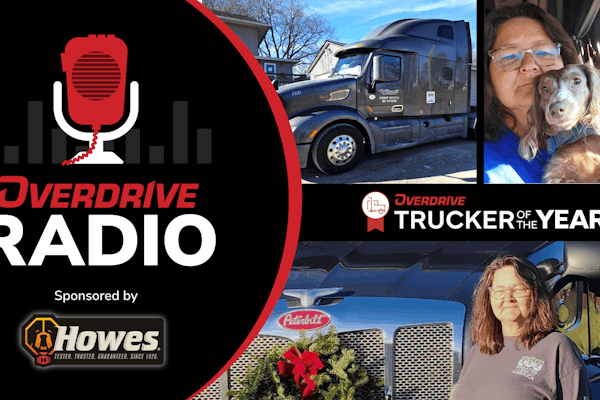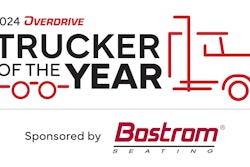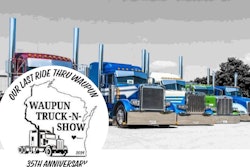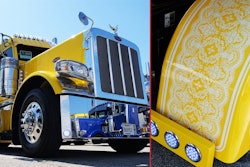Five experienced truckers offer insights and tips freshman drivers won’t get in school.
One of the most frequent complaints we hear from experienced drivers is that newbies have no respect. New drivers, they say, don’t listen to advice and don’t have an accurate idea of what it means to be a truck driver.
But if you’re a newbie – or are thinking of becoming a trucker – and do want to learn, keep reading. We asked five drivers with a combined 91 years of experience what advice they would give if they could sit down some new drivers and tell them the most important things they’ve learned over the years.
Here are their best words of wisdom:
Driving isn’t for everyone.
From the general population, only a few are cut out to be over-the-road truck drivers.
It’s demanding work, belied by its simple job description: deliver freight safely and on time. As they do this, professional OTR drivers have responsibilities and face hazards that the public simply isn’t aware of – from weather, traffic, and construction delays to ever-more-complicated maintenance and regulations – while simultaneously focusing on and practicing intensive safety in a distinctly unsafe environment. It’s highly stressful, often for long periods. Most people can’t maintain the safety focus while dealing with the job’s other pressures and still be on time, fed, clean, polite and content.
The money’s OK and gets better, but it’s not often high enough to convince people who don’t feel satisfaction from doing the job. If that’s the case, they’re not staying in the seat for very long.
But even experienced, happy OTR drivers aren’t hanging with the Trumps and the Gates.
“These new drivers coming out, the thing they need to get out of their heads is the idea that they’re going to get filthy rich,” says semi-retired, 44-year driver Charlie Wandle of Cherryvale, Kan. “The general public think truck drivers make millions. That’s about as far from the truth as you can get.”
Some drivers buy a few trucks, start small companies, keep driving and, over time, become millionaires. But most OTR drivers make a decent living – and work hard for it.
Still, many who enjoy and excel at truck driving stay with it because truck driving is far beyond a simple job description. It’s not something you do, it’s someone you are: someone who lives on the road – a true adventurer, self-sufficient, fully aware that anything can and will happen.
The OTR trucker is a specific personality type living inside some people. If it’s in you, you’re also suddenly and unexpectedly a problem to some others, and you won’t learn that in school or orientation.
“One of the things we hate the most is being stereotyped,” says Marten Transport driver Steven Lopez from Boston, Mass. “You tell somebody you’re a truck driver, and right away you’re a dirty, nasty pig. I am so tired of that. I hate that.”
Professional drivers constantly deal with stereotyping, misreported stories coming across the airwaves about fellow drivers or brazen insults from the motoring public. That’s hard to take, and here’s why:
“We come out here in blizzards and all kinds of weather and all kinds of road conditions to make sure people get what they need,” Lopez says. “We provide a valuable service, and for the majority of people to put us down the way they do – it’s not right.”
The issue isn’t whether truckers deserve respect, but rather how to make people aware that truckers are flesh-and-blood human beings who fill an enormous and crucial need.
“They don’t do any television shows about that,” Lopez says. “I don’t think there’s enough public awareness about truckers – about the job we do.”
OTR truckers deal with ignorance. They sacrifice and work hard to serve their country, which sometimes seems darned ungrateful. Welcome to trucking. But there’s no use in dwelling on it. It’s not fair, and letting it go is hard. But it’s currently part of the job. Holding onto that will sour your attitude, and to experienced drivers, attitude is job one.
It’s a job, not a party.
Our experts sharply criticized the attitudes some new drivers bring to truck and roadway.
“You go out here and get in a truck and hammer down and party and make money,” Wandle says, paraphrasing a common attitude. “It’s none of the above. But a lot of new drivers think that’s what trucking is.”
For several big reasons, partying and trucking don’t mix. The danger is obvious. When they’re not on home time, OTR drivers are on call 24/7. It might be Saturday, and you might be sitting until Monday, but emergencies happen. If dispatch repowers a load to you to get another driver home and you’re intoxicated, you’ll likely be fired. That’s on your record, and you’ll have a hard time getting another truck-driving job – or any job, for that matter.
“The public as a whole thinks that all truck drivers do is get high and party and things like that,” Wandle says.
Drivers who do won’t last long. They create problems for themselves and quit, get fired or kill somebody and/or themselves.
“They come out of school and think they’re super truckers,” Lopez says. “Don’t come out here and think that because you have a CDL you’re Billy Big-Rigger.
“The job’s too dangerous for that. There are just too many people on the road.”
You catch more flies with honey.
Experienced drivers also have lots to say about the lack of respect rookies bring with them.
“They need to learn how to respect and have courtesy for other drivers,” Lopez says.
“Say ‘thank you’ by flashing your marker lights after passing, when another driver flashes his headlights so you can get back in the right lane,” says owner-operator Dale Hayden of Lucama, N.C. “When you signal other drivers, flash your low beams on and off instead of blinding other drivers with your brights.”
“When you have a slow truck, stay in the right lane,” Hayden says. “One driver says he gets in the middle lane and goes 55, and he doesn’t care who he blocks. Other drivers can’t get around him, and he creates traffic problems.”
Other motorists will soon risk everything just to get by.
Many carriers govern their trucks at 65, and that can create problems if you don’t know how to handle it. For one thing, most traffic moves a lot faster, and truckers see the hazards split speed limits cause. For another thing, 65-mile-an-hour trucks can’t pass each other on level highway.
“If you have two trucks governed at 65 and one is trying to pass the other, they’ll block both lanes forever. These new drivers just don’t care.”
Again: it’s part of the job. Don’t struggle with it. Back down and solve the problem. After all, good, safe driving is your job, not your hobby. If you can’t pass, put on your right blinker first, then back off a little and merge right, out of the way. Conversely, if another vehicle can’t pass you and the driver won’t give up, don’t fight. Solve the problem; slow down a tad for about 10 seconds to free up the traffic flow.
All motorists make mistakes, so it’s unrealistic to expect otherwise. No matter what kind of vehicle it is, when a driver makes a mistake, defuse – don’t add fuel to the fire. Help people drive better. You’re the pro on the job and on the scene. If not you, who else?
Likewise, an OTR driver’s temper is no friend when customers cause problems.
“Learn some people skills,” Hayden says. “When they tell you they’re going to unload you in 30 minutes and 13 hours later you’re still sitting there, don’t get mad.”
The CB isn’t your personal venting place.
Another attitude failure sharply criticized by professionals is inappropriate language and conversation on the CB radio. Three decades back, truckers didn’t permit cursing, name-calling and taboo subject matter on channel 19. For one thing, it gives trucking a black eye. For another, it’s embarrassing. But most of all it’s a clear demonstration of low character: an aggressive attack on occupational traditions of respect and decency. Maybe foul-mouthed CB talkers are the minority. Nonetheless, they provide all the justification that trucking enemies need to look down on the lot.
“They need to learn how to clean up their language on the CB,” Hayden says of some newbies. “Every other word is f- this and f- that.”
Some drivers’ reactions to women on the CB are bizarre.
“When a woman comes on the CB, that doesn’t mean she’s a whore,” Hayden says. “My wife won’t even talk on the CB anymore because other drivers don’t have any respect for women. She can’t talk for five minutes before somebody comes on and says something to her like that.”
Broadcasting profanity, name calling, personal attacks and inappropriate subject matter over the CB, for the world to hear, is as unjust and hypocritical as the disrespect truckers get.
“Have a better attitude about life in general,” says owner-operator Vaughn Miller of Halfway, Mo. “You have to remember who you’re driving for and have some self-respect.”
“Faith and family is our main thing,” Hayden says. “Most truckers are just regular, nice, everyday people.”
Living in a truck is a lifestyle overhaul.
The OTR trucker driver’s lifestyle requirements will challenge new drivers – even the naturals – plenty at first.
“New drivers need to learn to live out on the road,” says owner-operator Hap Greener of Harvey, La. “That’s the hardest thing. When you first get out on the road, your mind-set is you have a full kitchen and full bathroom, and you can eat and shower when you get home.”
Now “home” is the truck, but most newbies don’t know all that that means.
“You have to change your way of thinking,” Greener says. “Learn to eat in the truck and out of the truck.” Everything you need is available – just a little farther away.
“I wish I’d have been more knowledgeable of what services there are for drivers at truckstops,” Lopez says. Even if it’s not at the truckstop, it’s accessible, whether it’s a haircut and new clothes, dental work or a confession booth, you can find it by asking. If a big truck won’t fit, most truckstops don’t mind if you park a few hours and take a cab.
Some new drivers relearn personal care, improvise and solve problems. Some don’t.
“You have to remember you’re out here on your own,” Wandle says. “Nobody’s looking over your shoulder telling you what to do, so you have to be responsible. It’s up to you to get the job done without anybody telling you to.”
None escape the struggle to adjust. Maturity plays a role, but some newbies clearly don’t know what to expect.
“One thing new drivers have to learn is time management,” Lopez says. “A lot of them don’t do that. They’re playing video games and stuff in the truckstops, and then they’re hitting the road at 1 a.m. Now they’re driving tired, getting in wrecks and killing themselves and others.”
Trucking schools can’t teach maturity, but they can emphasize immaturity’s risks for OTR drivers when it comes to managing time. At best, the job becomes impossible, and immature drivers quit or get fired. At worst, they’ll rush or drive fatigued, and people get killed.
Maturity means planning and preparation. That’s why so many experienced drivers carry ever-increasing amounts of spare clothing, blankets, food and truck parts, fluids and tools. Auxiliary power units also increase an OTR driver’s independence.
“Schools need to teach new drivers how to come out here and be prepared for anything,” Lopez says. “They might get stuck on the road in the winter. They need food, water, warm clothes and a means of communication.”
In emergencies, OTR drivers typically are on the scene providing crucial help to others. But new drivers often haven’t learned how to take care of themselves, and some never do.
“In my personal opinion, most companies put drivers out there at 21, and that’s too young,” Hayden says. “They run them through these schools in six weeks. They go from a school to driving an 18-wheeler hauling 80,000 pounds, and most of them have been driving four-wheelers all their lives.”
If you are that young, you can succeed – you’ll just have to work a little harder to develop the maturity required to be a good professional driver. Keep these tips from the pros in mind, and soon you’ll be proving the stereotypes wrong.
Driving Skill Tips
Owner-operator Vaughn Miller, Halfway, Mo. – 18 years experience
- “When you’re driving in the city, pay attention. Don’t be looking around at other things.”
- “A truck is a heck of a lot bigger than a car. You have a lot more weight. It takes a lot more room to stop.”
Owner-operator Charlie Wandle, Cherryvale, Kan. – 44 years experience
- “When you’re parking between other trucks, get out and look. Don’t just assume you have enough room.”
- “Be aware of the things around you.”
- “Think ahead.”
- “You have to drive for everybody else in order to be safe.”
- “It takes a lot more room to turn.”
Owner-operator Dale Hayden, Lucama, N.C. – 15 years experience
- “Flash your low beams on and off instead of flashing your brights.”
- “Never take a shortcut across a mountain range.”
- “Never violate the rules, even if your company tells you to do it.”
Steven Lopez, Marten Transport company driver, Boston, Mass. – 7 years experience
- “If your dispatcher gets pushy, you need to get hold of the safety department.”
- “Some motorcyclists give me less than a foot of clearance.”
Owner-operator Hap Greener, Harvey, La. – 7 years experience
- “The hardest thing a new driver learns is to watch the tandems when turning corners.”
- “Until you perfect your backing skills, stop early to get a parking spot before it gets dark and the lot fills up.”
- “Keep it simple. Don’t make it harder than it has to be.”
- “Never park nose first because you have to back out, and you might not be able to wait until the lot empties so you can see.”
- “Don’t back up unless you have to.”
Driving Tip Emphasized by All Five Drivers – 91 years experience
- Use common sense or get out of the truck.







